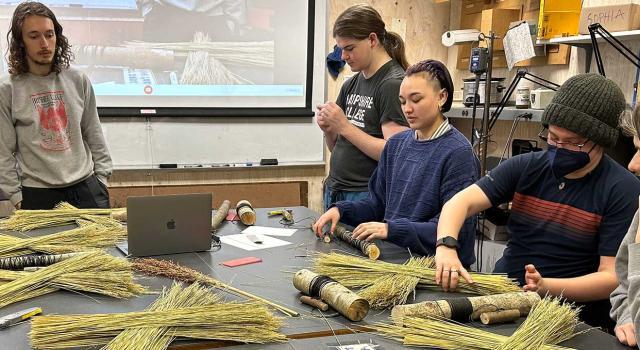
Donna Cohn

Donna Cohn, associate professor of applied design, holds a B.S. from the College of Human Ecology at Cornell University, and a master's in industrial design from the Rhode Island School of Design. She has worked with the Boston Center for Independent Living as a designer and builder of devices for people with physical disabilities. Her design process emphasized collaboration with the end user and the use of low-cost tools and materials. This way of working continues to inform her current design practice and teaching.
A member of the Hampshire faculty since 2002, her courses emphasize consideration of practical problems that directly impact communities, paired with hands-on iterative design. Her professional work, personal life, and teaching are deeply intertwined. She builds curriculum around design challenges on the Hampshire College campus as well as local community groups. She works with Hampshire Youth Connect, planning and effecting programming to introduce underserved youth to the college experience.
In 2013, she received a Grand Challenges Explorations grant from the Bill and Melinda Gates Foundation to develop and field test prototypes of a low-cost pearl millet thresher for use in sub-Saharan Africa. This project evolved out of discussions with a former student then working in Namibia. Cohn brought the project to the 2008 International Design for Development Summit (IDDS) held at M.I.T. and has continued design work over numerous semesters of her Appropriate Technology classes. Documentation of the thresher can be viewed here.
Her other interests include rearranging and putting things into and onto soil, ecologically sustainable technologies, dogs, cats, and other animals.
Recent and Upcoming Courses
-
Design Fundamentals: This is an introductory level design class focusing on understanding problems, generating ideas and developing practical elegant solutions. We will begin with a series of guided activities and projects, with the course culminating in a final independent project. Students will become familiar with a range of basic design tools and skills, such as drawing, computer aided design, model making, and prototyping in materials such as cardboard, metal and plastic. Throughout the course students will work toward improving visual communication skills and the ability to convey ideas. Keywords:Design, fabrication, hands-on, Center for Design,
-
This class is a collaboration between Hampshire College faculty Donna Cohn and Division III student Luka Eriksen. We will start the semester by learning and practicing the techniques of traditional broom making that Luka learned while enrolled at Berea College in Kentucky. We will gather natural materials from surrounding local habitats. We will make brooms that are functional, to a chosen specific task that can also be beautiful works of art. We will explore the meaning and value of making things by hand, using renewable materials, and practices that have little negative impact on the environment. We will also look at other examples of broom making - the medium and high-volume production of inexpensive brooms. This class will involve a combination of reading, writing and making objects. You must apply to be in this class - we are looking for people who are willing and able to commit the time it takes to engage with the readings, attend class regularly and practice this craft which requires a fair amount of hand eye coordination, body awareness and patience. Each student will do a final project which involves designing and making an object, either to sell, barter or give as a gift.
-
Look Ma, No Hands: An introductory design class focused on assistive technology: We will learn about some of the practical and ordinary problems faced by individuals who do not have full use of their hands or arms, then design, fabricate and collaboratively design assistive devices. Projects may be for children, or adults with temporary injuries/conditions or ongoing physical disabilities. We will also examine the concept of "Universal Design" - designing in a way that gracefully accommodates the range of human experience. Students in this class will develop problem solving, visual communication skills and a wide range of fabrication skills. There will be opportunities to work with the full range of materials and tools available in the Center for Design shop - such as metals, plastics and basic electronics. The curriculum will include weekly design assignments, guest speakers, readings, film viewings, discussions about the design process itself, as well as a major project Keywords:design, fabrication, physical disability, problem solving
-
Mechanical Motion for Artists and Designers: We will learn how to build objects that move! Using wire, sheet metal, paper, wood, and a range of other media, we will examine and build mechanisms. We will contemplate the basic ingredients of mechanical forces and motion such as bearings, cams, cranks, gear ratios and more. Each student will develop an independent project that incorporates some type of physical motion. All levels of experience are welcome, but students should be comfortable using hand tools, able to devote at least 6 - 10 hours a week outside of scheduled class time working on projects.


